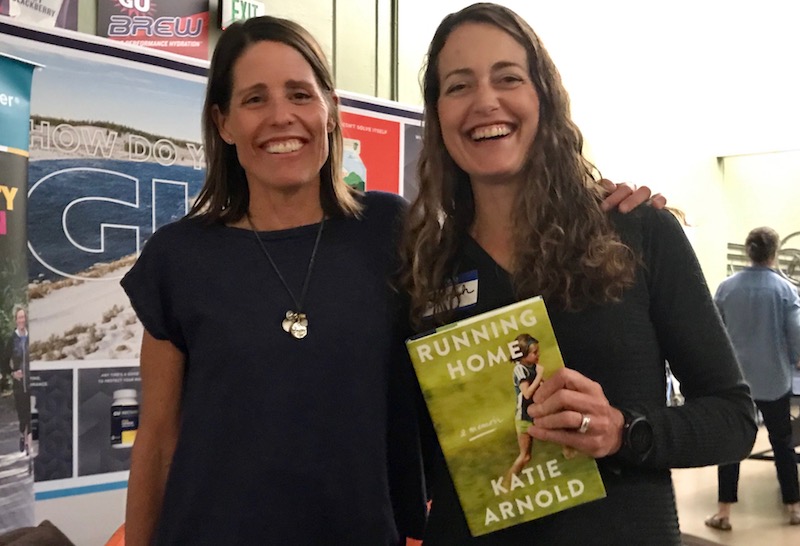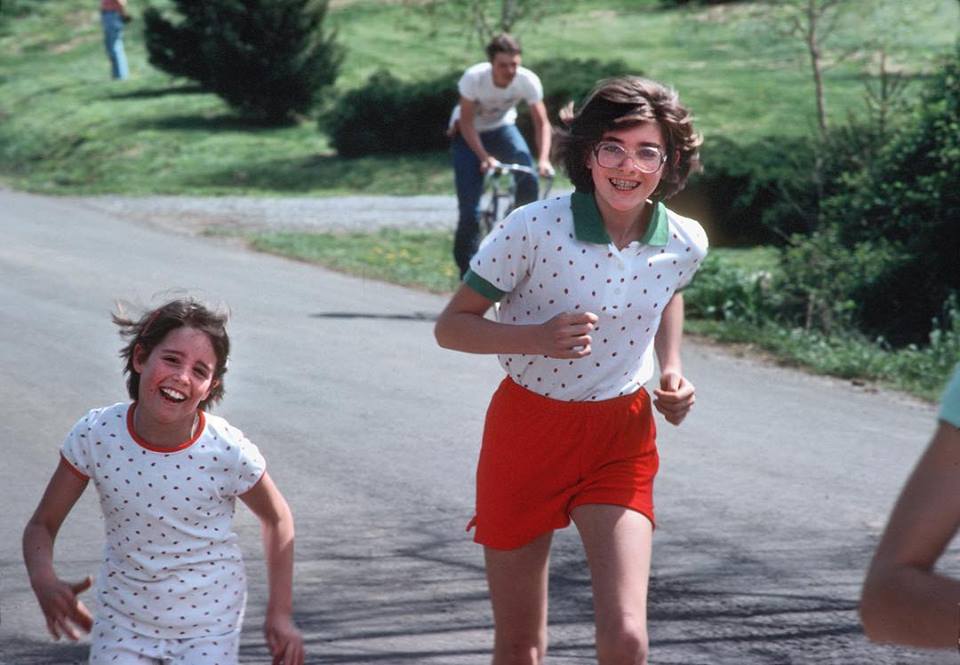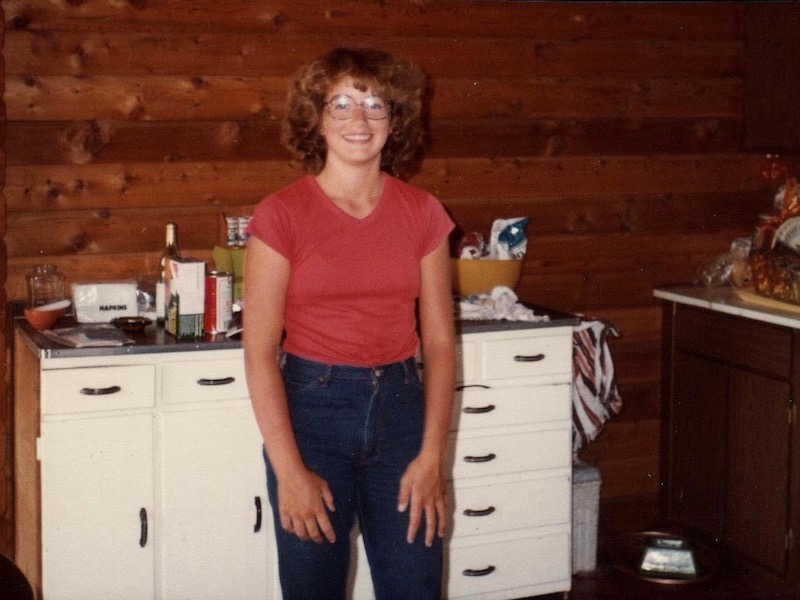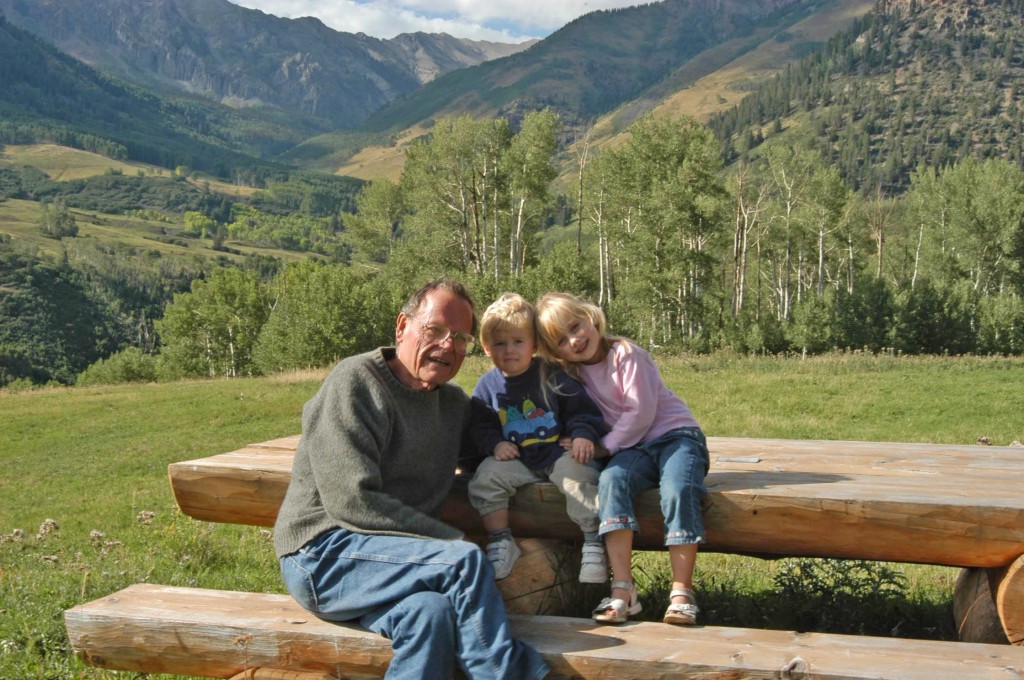I finally finished Katie Arnold’s captivating and moving memoir, Running Home. Normally with a book that I like this much, I might use the cliche, “couldn’t put it down.” But in this case, I’d say the opposite: I had a hard time picking it up. I let several days lapse between chapters. Still, I savored and recommend it. Others probably will read it in a few sittings, as it flows like her running.
This is a book about the therapeutic power of running and becoming a top ultrarunner. But it’s the backstory about her family, and her personal development, that drew me in, even when chapters served as a sometimes-painful mirror of self-reflection. If you share our demographic of finding yourself in midlife handling the dual roles of raising kids while coping with one or both parents’ decline and passing, and of reflecting on long-simmering questions about your own childhood, then you likely will be drawn in, too, even if you’re not a runner.
Katie’s memoir goes back and forth between her scrappy, latchkey childhood, during which she navigated her parents’ bewildering separation (“In the 1970s, there wasn’t a roadmap for how to get divorced”) with the help of her big sister Meg, and her adult life as a writer for Outside magazine, raising two young girls with her husband in Santa Fe. Mostly it’s about the intense relationship with her complex, inspiring and imperfect father, David Arnold, who worked as a photographer for National Geographic and dipped in and out of the girls’ lives after he and their mother split.
When the adult Katie gets news of her dad’s kidney cancer diagnosis and helps care for him until his passing in December 2010, she begins to untangle questions about her upbringing and the divorce. She also copes with debilitating anxiety and hypochondria fomented by postpartum stress after the birth of her second daughter and by grief from the loss of her father, whose attention and guidance she always craved.
Because of that anxiety, Katie became a barely functioning mess during most of 2011. Running—her latent talent and old friend, the sport she discovered and excelled at naturally at age 7 when her dad suggested she run a 10K—came to the rescue, helping her regain footing in life and deepen her understanding of her childhood and father.
I’ve read enough books about ultrarunning, and enough race reports (and written my fair share), that I found myself slightly less interested in the passages that describe how she trained for ultras and how her races unfolded. I bet, however, that aspiring runners will find these sections fascinating and feel inspired to go for a run after reading her book.
But Katie’s skill as a writer—her original turns of phrase or simile—always held my attention. For example, she describes running in a way that makes me think, yes, exactly, after she finds her father daydreaming. Her dad told her that when he daydreams, he sometimes comes up with answers to problems and always feels refreshed. Katie writes:
This was what happened when I ran. Running was like putting lettuce in a bowl and tossing it with salad dressing, jiggling loose my ideas, so that by the time I finished, everything was coated and interconnected. I saw links I’d missed, and I knew what to do and how to get forward.
I should explain that I’m calling her Katie, and not following the journalistic convention of using her last name, because I consider Katie Arnold a friend with whom I developed a long-distance relationship, through email and social media, over the past few years. About four years ago, we traded messages about Eurovans and ultrarunning, and then I interviewed her on UltraRunnerPodcast about her phenomenal win at her 100-mile debut, the 2018 Leadville 100 (check out the interview, as it picks up where her book ends and tells what would’ve been another great chapter). We finally met in person this spring at a book event in Berkeley.

Katie is three years younger than I, and some of my favorite passages in her book involve early-childhood descriptions of her and Meg, who like me was born in 1969, and their zany, minimally supervised 1970s childhood. So much of what they did, I did too as the fifth child of laissez-faire parents, such as when Katie describes roaming free around the neighborhood while taking notes and pretending to be Harriet the Spy.
And like Katie, I gained new perspective on my parents’ parenting style—a mix of shock and grudging respect—once I had kids of my own. While Katie focuses mostly on her dad, she writes poignantly about her single working mom, whose optimism and energy she appreciates more deeply as an adult. In this passage, she reflects on her mom giving the go-ahead for Katie and Meg to ride their Big Wheels down the street after dinner:
“Side by side, we haul off down the hill, gathering speed, lean on the foot brakes, and clatter to a stop in front of Mom. She is clapping and beaming the way she did with her whole face—her green cat eyes and straight white teeth and dimples. … At the time, I thought this was what all mothers did: work full time and fix leaky toilets and wash our wool tights by hand and run the car pool and call us down the hill until it’s almost dark, and then get up and do it all again, by herself. Only now that I’m a mother do I see how radical this was, how tired and lonely she must have been. Not that she ever let on. In my memory, she is waving madly, her smile throwing sparks at the bottom of the alley, yelling, ‘All clear!'”
Because Meg and I are the same age, and apparently Meg also went through an awkward preteen phase with dorky glasses and poofy hair (see photos below), I felt a kinship with Katie while reading her book, as if I were her sister.


But like an older sibling, I experienced feelings of admiration mixed with annoyance as I read about Katie’s accomplishments, the way siblings feel when one upstages the other. Here is where I confess that her memoir felt at times uncomfortable to read because it stirred within me petty feelings of professional and athletic envy, which made me dwell on what I could’ve or should’ve done better in life, and to contemplate that maybe I just wasn’t good enough or didn’t work hard enough to achieve what she did.
It’s kind of crazy how many parallels exist between my life and Katie’s. While reading her memoir, I kept getting the feeling that everything I did, Katie did too, but much, much more successfully. It’s pretty funny, actually. To wit:
- I graduated to ultra-distance trail running in the mid to late 2000s and achieved some podium finishes at regional events. Katie started running ultras in 2012, at age 40, and won almost everything she entered.
- I profiled Dean Karnazes for a Trail Runner cover story. I ran with him while interviewing him, and in the process re-injured my calf and couldn’t run for several months. Katie profiled Dean for a cover story for Outside, and while interviewing him during a run, she ran her first full marathon at his side.
- I traveled nomadically with my husband and two kids for a year, teaching them the equivalent of 3rd and 6th grade on the road, and started a blog about round-the-world family travel and “roadschooling,” but my blog withered in obscurity. Katie and her husband took their two kids on numerous far-flung outdoor adventures, and Katie developed a popular parenting column for Outside called “Raising Rippers.”
- I wrote a trail-running book combining storytelling with practical coaching advice, and while it’s done reasonably well, it’s stuck in a niche with little marketing support. Katie wrote a trail-running memoir and is experiencing a breakout success with a major publisher and positive reviews in The New York Times and Washington Post.
These and other similarities between our lives deepen my admiration for Katie, even as I struggle with my insecurities.
On a more serious and painful level, however, I couldn’t stop comparing the thoughtful, thorough way Katie handled her father’s death, and how she made sense of his character, with the way I’ve put off grappling with complicated feelings toward my dad and the suppressed grief of his passing.
My dad died from lung failure in 2013, and in the past couple of years I’ve missed him more and felt haunted by his memories. Running Home opened a Pandora’s box of emotions regarding my dad, including regret for how our relationship deteriorated in his final years, and guilt for all the unfinished business I face to memorialize him, such as sorting through his archived correspondence and writing about our family times. I wrote this blog post about his death and how running helped me cope, but Katie’s memoir made me ponder how much more I have to figure out and write about his life and death, and how I could have handled aspects of his decline and our time together better. When I think about him now, I feel my antipathy toward his offensive traits soften, and I yearn for all the things he did that made me feel special and loved.
When I finished Running Home, I wanted to turn back time and run back to my dad. I wanted to revisit our old letters, find his forgotten journals, log into his dormant email account, and make better sense of why he acted as he did and how he shaped me.
And isn’t that one sign of a great book—that it makes you self-reflect and contemplate your life path as you learn about the lives of others?

You can buy Katie’s Running Home through Amazon here or better yet, support independent booksellers through this link. And aren’t two books better than one? 😉 If you’re inspired to train for ultras after reading her memoir, I hope you’ll get my book The Trail Runner’s Companion, on Amazon here or through Indibound.

Great review. I love the way you related it to your own experience. I am ready to read Katie’s book for the second time. I feel like I need to take more time to really digest it.